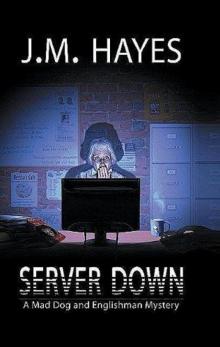- Home
- J. M. Hayes
Server Down Page 10
Server Down Read online
Page 10
And then a door opened and a man in scrubs ushered a smaller man into the hospital.
“Quick!” Matus threw his door open and stumbled into the parking lot.
Heather was right behind him. Ahead, actually, since it took Matus a moment to regain his balance. She sprinted for the door, grabbed the handle, and yanked.
“Locked,” she said. “How do we get in?”
Matus was reaching for his belt. “Damn,” he said. “Bastard stole my gun.”
Heather felt herself blush. At least it was too dark for him to notice. She pulled the gun from under her jacket and put it in his hands. “Sorry. I borrowed it while you weren’t at your best. In case he came back.”
He slammed the butt against the door, three times. “This is how we get in,” he said. “This and my badge.”
“Careful. I put a round in the chamber.”
“Good,” Matus said. “Because if someone doesn’t answer this door in about thirty seconds, I’m going to blow a hole in the lock.”
Heather didn’t think shooting at a hospital was a good idea. She started to say so but then the door opened and Uncle Mad Dog was standing there.
She watched Matus’ jaw drop as Mad Dog said, “Somehow I knew that was you. Hurry, I’ll show you where Fig Zit went.”
***
Sheriff English removed his jacket and draped it over the charred ruin of what had once been a face. It would be too easily visible to the small crowd that had gathered in front of the courthouse. The distant street and porch lights weren’t enough to illuminate the scene, but a gibbous moon was. That and the flashlight beams that were beginning to duel like low-wattage light sabers over the lawn and the seared body. The explosion had taken down the power and phone lines to the courthouse. The former arced and sputtered like an electric serpent, writhing at the south end of the building. The row of streetlights that should have lit the front of the courthouse was entering its third year of waiting for someone to get around to that county repair order.
The sheriff used his walker to steady himself as he went to one knee and felt for a billfold. Its leather was blackened and steaming. The driver’s license had begun to weld itself to a credit card, but the picture and identity on its face were still recognizable. Not that there would be any matching this picture with this face. Both, however, apparently belonged to the Edward Miller whose pickup waited on the edge of Veterans’ Memorial Park across the way.
“You all keep back now,” Mrs. Kraus told the curious crowd, “and stop bothering us with your questions. You know we can’t reveal stuff in the middle of an active investigation.”
An aging Buick station wagon eased around the corner and nosed through the crowd. Its color was obscured, even when the occasional flashlight swept across the caked mud and layers of dust that covered its paint. The sheriff remembered a time when it had shone, back when Doc Jones, Benteen County Coroner, first brought home his converted ambulance. Sadly, it had carried far more dead than injured. And the sheriff could tell Doc was realizing it was about to perform that unhappy task yet again as he parked and climbed from behind the wheel. Doc’s perpetually glum face sagged into a still more forlorn expression. The sheriff pulled himself to his feet and went to meet the coroner.
“When that explosion woke me, I figured I was needed,” Doc said. “Though I hoped it wasn’t in my official capacity. What happened?”
“Mrs. Kraus and I were in the office. Then bang, and we’re in the dark and the windows are all blown in and someone’s running around the lawn, burning to death. Mad Dog’s house got blown up earlier tonight. Luckily, Mad Dog is out of town.”
And in a hell of a mess down in Tucson, the sheriff might have added. It was just too complicated to get into, though. “I’m guessing this is the same fellow who was responsible for that. And that it’s Ed Miller, since that’s his truck over there and our corpse was carrying his wallet and driver’s license.”
Doc’s face made the transition from sad to puzzled. “Ed Miller?” he said. “Why on earth would Ed want to blow up you and Mrs. Kraus?”
If he knew that, the sheriff thought, he’d have something to go on and, maybe, a way to help Mad Dog and Heather in far off Tucson. Maybe even, some hint that could lead him to Fig Zit.
“I haven’t got a clue, Doc.”
“Bombing you and Mrs. Kraus doesn’t make any sense,” Doc said. “Though Mad Dog, I can kind of understand.”
“Really?” The sheriff was surprised.
“Yeah. Ed told me he finally got himself a decent paying job. He just started with the people planning that ethanol outfit your brother’s been trying to keep out of Benteen County.”
***
Heather wasn’t surprised when Mad Dog didn’t wait to see how she and Captain Matus reacted to Mad Dog’s surprising announcement.
“Follow me,” her uncle told them. He whirled and went pounding down the hall like a fullback into an off-tackle hole his linemen had just opened.
She was even more surprised that Matus didn’t seem to consider shooting Mad Dog in the back. The much-smaller Sewa followed on Mad Dog’s heels, gun out, badge up. Not that there were any people trying to impede their progress. Heather found herself trailing the pack, and tossing an apology to a terrified nurse trying to climb the wall rather than deal with any of the wild bunch invading her hospital.
“One of these doors along here,” Mad Dog called over his shoulder. “They were going in just as you knocked.” He reached out and tried a knob and it turned.
“This one, I think,” Mad Dog said. And then, just before Heather got to it, “Oh yeah. This one for sure.”
Matus stopped dead in the middle of the doorway and Heather nearly ran over him. Then she saw why. Mad Dog stood in front of a desk heaped with papers and photographs of smiling people. Two other men were in the room with him. They both wore scrubs. One sat on the floor with his back to the desk and a surprised look in already cloudy eyes that stared at the syringe protruding from his torso, angling up, just under the sternum. The other man was lying against the far wall and he seemed to be having a seizure. He thrashed about madly, clawing at his neck and making strangled noises even though no one was doing any strangling.
Mad Dog bent and rolled him over. Heather could see that the man’s neck was red and bleeding. With the way he was tearing at his throat, she wasn’t sure he hadn’t made those wounds to his own flesh. But his eyes were bugged out and his face had gone unnaturally pale.
“What?” Matus said. Heather wanted to echo him.
“God he’s fast,” Mad Dog said. “Fig Zit already killed that one and he’s crushed this guy’s windpipe.”
“Get a doctor,” Matus said.
“No time.” Mad Dog fumbled in his pocket and came out with a red pocket knife. It was the one she’d told Matus about earlier in the evening, back when he was busy trying to link Mad Dog to a switchblade.
“What are you doing?” Matus said.
“Saving his life,” Mad Dog said. “I hope.”
Mad Dog bent and pulled the man’s arms away with one hand and plunged the blade of the miniature Swiss Army knife into the strangling man’s throat. Matus started to swing his gun up but Heather put a hand on his arm so it couldn’t find a target.
“Wait,” she told the captain. He stopped resisting her because gushes of air flew in and out of the wound and spotted Mad Dog’s face with blood and added bright speckles to the bold pattern of his plaid shirt. A wild, wet sucking sound accompanied them, but the man Mad Dog had just knifed stopped fighting so hard. Blood-wet air hissed in and out of his lungs and the blue tint in his face began to return to normal.
“Get help,” Mad Dog said, reaching for the throat of the man leaning against the desk and seeking a pulse. “One of these guys still needs it.”
Heather turned back into the empty hall. “Help!” she yelled. When she looked back she saw a small bottle on the desk next to a picture of the man with the needle in his chest accepting an oversiz
ed check from someone with a big cowboy hat and a false grin.
Mad Dog glanced at the bottle and said, “What’s potassium chloride?”
“That’s the last part of the chemical cocktail they use to execute people,” Matus said. “The one that induces cardiac arrest.”
“I think Fig Zit knew that. And I think he saw this label.”
“These people tried to kill him?” Heather asked.
“Looks that way,” Mad Dog said. “But they only made him angry.”
Mad Dog started across the room. That’s when Heather first noticed that the smock hanging on the room’s other door was still swaying.
“Where do you think you’re going?” Matus said.
“After Fig Zit,” Mad Dog replied. “He’s hurt. He came for help and almost got ambushed. He’ll just be trying to get out of here now. Maybe I can catch him.”
Mad Dog opened the door. Heather saw another corridor beyond. And thought she heard the faint echo of footsteps, of someone running. She started to elbow her way around Matus but he had his gun pointing at Mad Dog’s back again.
“Wait,” the captain said.
“For what?” Mad Dog answered, not slowing down or looking back.
“For…for me,” Matus said, and sprinted to the door Mad Dog had just gone through.
Someone had to stay and get help. The guy on the floor was breathing all right, but he could still drown in his own blood, right here at the back of the emergency department of a major hospital if she left him.
“Damn!” she said. She turned back to the corridor they’d followed to get here and shouted for help again.
***
Ed Miller’s truck sat nose first to one of the evergreens that had begun taking over Veterans’ Memorial Park after the last round of Dutch Elm disease. The sheriff approached the vehicle, warning the crowd to stay clear. He was sure the truck had been the source of the explosive device that left Miller’s body a charred mess on the courthouse lawn.
The bed of the old Ford held a couple of rolls of heavily insulated wire and a few rusty tools. Nothing particularly dangerous. The cab was another matter. A box of 40 mm rounds for an M79 grenade launcher sat on the passenger’s seat—one missing. Incendiaries, if the sheriff’s memory of shapes and color codes was correct. They wouldn’t be much use since the grenade launcher had been left on a barbed wire fence as Miller ran away from the house he’d destroyed a few hours earlier.
But Ed had been a resourceful handyman ever since he came home from Southeast Asia. Not successful, maybe, but known for making do with whatever came to hand. In this case, what came to Miller’s hand might have been smuggled home from Vietnam along with that grenade launcher, that and scrounged from a surprising inventory.
Back in Nam they called them Bouncing Betties—antipersonnel mines that, when triggered, ignited a propellant sending them to a height of about a meter before the main charge exploded. That spread the mine’s shrapnel farther and did more damage to anyone unlucky enough to be in the vicinity of the person who set one off. One of those mines was duct taped to a cheap, re-corked wine bottle. That wasn’t wine in there, though. Down on the floorboards on the passenger’s side were three containers and a funnel. One was a gas can. The other two he wouldn’t have recognized without the labels, BENZENE, and POLYSTYRENE. The sheriff didn’t remember the proportions, but those were the essentials you combined to make napalm. When Miller couldn’t shoot ready-made explosives into buildings anymore, he must have decided to use the mine to set off a homemade replacement.
The sheriff turned back and looked across the street toward the front of the courthouse. It hadn’t burned. Except for missing windows, it looked remarkably undamaged. With better light, the sheriff thought he’d find chips in the bricks where shrapnel fragments from the Bouncing Betty had torn into its facade. Miller must have thrown his improvised device at the sheriff’s window. And the unwieldy package evidently missed, hit the brick wall, ignited the launching device, and propelled the weapon back the way it had come. When it exploded and set off the napalm, it must have been right on top of Miller. Maybe the man had even tried to catch it for a second try. Whatever, much of his chest had burned away as he turned himself into a human torch that still smoldered and smelled of scorched meat.
That was simple enough to reconstruct. Why Miller would go to such extremes to protect his new job was something else again. As was why another of those jury-rigged devices lay on Miller’s front seat.
It sat atop a little notebook. The sheriff reached through the truck’s open window, carefully avoided the mine’s detonator, and extracted the book. He used a flashlight he’d commandeered to examine Miller’s tight scrawl.
“2,” it read, “MD home. 5:30, court. 5:35, E-man home.”
The last line seemed to indicate the sheriff’s house was the intended destination for this last device. English glanced at his watch—5:12. Miller had decided to hit the courthouse early. On his own? On someone’s instructions? Fig Zit’s, maybe?
There was one other item on the seat beside the explosives. A cell phone. Its record of calls might answer the sheriff’s question. He made very sure it wasn’t connected to any of those grenades or the duct-taped combo, then pulled it out of the cab. He went through the phone’s options and was disappointed to find no numbers programmed into its memory. But there was another selection labeled “Recent.” When the sheriff chose that, he got “Received” and “Dialed.” The “Received” column was dominated by someone labeled “Private.” “Dialed” went almost exclusively to “FI.” He selected that one and punched the call button. The phone rang once before a man’s voice screamed in the sheriff’s ear.
“Idiot! Don’t you check your messages? Didn’t you hear me yelling at you not to do Mad Dog’s place? And you weren’t supposed to hit the courthouse until five-thirty.”
The voice sounded faintly familiar, but cell phones never helped with voice recognition. The sheriff answered the tirade with a noncommittal grunt.
“Well, did you kill them at least?”
The sheriff grunted again.
“Wait,” the voice said. “Who is this?”
The sheriff hit the disconnect button. Who could he find to tell him what number this thing had dialed? And, more important, show him where the phone it reached was located? The Kansas Highway Patrol would probably send a cruiser to pick the cell up and analyze numbers and addresses for him, but he wanted faster results. Before he could think about local possibilities, Miller’s phone rang. Why not, the sheriff thought. He flipped it open and held it to his ear and made a noise that might have been “hello,” his name, or even the static of a bad connection.
It was the same voice, the one that had just asked if he and Mrs. Kraus were dead. “Give me your security code.”
The sheriff didn’t have that so he just stood and listened. It didn’t take long.
“Incompetents. I’m surrounded by incompetents. So I’m probably talking to you, Englishman. Well, maybe you won this round, but remember, your daughter should be experiencing the ultimate agony about now.”
The phone went dead before the sheriff managed to get out the expletive he had in mind. He said it anyway, because that was all a crippled man half a country away from his endangered daughter could do.
***
“How may I help you?”
The voice was the same, the professional thought, and yet not the same. This time, the man at Fick’s was surprised by his call. And that meant…?
“How is my report on the girl coming?” He kept his lips close to the phone’s receiver. He thought he’d shaken the people following him through the maze of halls in this hospital, but caution was how you survived in this business.
“Uh, you said sixty minutes….”
“I’m in a dynamic situation and my schedule has been altered. You wouldn’t know anything about that, would you?”
“I…well….” The man at Fick’s was rattled. And the professional thought he unde
rstood why. Fick’s had betrayed him.
“You found my client, didn’t you?”
“Why, no, of course not. We would have informed you….”
“And he made you a better offer, didn’t he?” The professional jogged up a staircase to stay ahead of the hunters. Considering the fresh bodies he’d left behind, those pursuing him would soon number more than the ones he’d heard, pounding down that hall from the office where he’d left one dead and one dying.
“I don’t know what you’re….”
“Yes you do. Give me his name and location and I’ll double whatever he paid you.”
“No, really,” the voice from Fick’s said, in spite of its full bodied tone, sounding young and scared and tinged with beginning panic. “I don’t understand what you’re talking about. What’s happened?”
“Oh, you know all right,” the professional said as he let himself out onto a deserted corridor one floor up. “If you don’t answer me now, understand that everyone at Fick’s goes on my schedule, gratis.”
“Is there a problem? Didn’t the nurse meet you? Didn’t…?”
“The client’s name. Immediately, or start looking over your shoulder.”
A pair of women in scrubs came out of a door behind him and he flowed around a corner. When he checked, they were going the other way, moving fast and conversing in business-like tones.
“Just a, uh…. Just a minute.”
“Now!” the professional hissed.
“All right. We found your client. Your client is, uh….”
They were going to lie to him. He knew it. And the name they gave him confirmed it.
“…is uh, Pamela Epperson.”
“That’s interesting,” he said, moving back down the corridor, looking for an exit. “Because, from what you’ve told me, Pamela Epperson couldn’t pay more than a few thousand dollars, even if she borrowed to do it.”
“We lied. The information we gave you about her. It was altered.”
“You lied, all right. Because I didn’t get the information about Mad Dog’s girlfriend from you. I got it from another source.”
“She may have gotten to them, too. She must have….”

 Broken Heartland
Broken Heartland Prairie Gothic
Prairie Gothic Spirit and the Skull
Spirit and the Skull The Grey Pilgrim
The Grey Pilgrim Plains Crazy
Plains Crazy English Lessons
English Lessons Server Down
Server Down